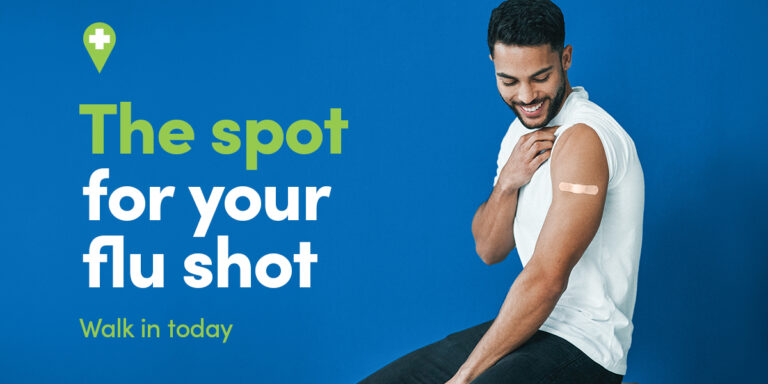Don’t let flu foil your fall fun — Get your shot today!
September 8, 2024

It’s that wonderful time of year again — the leaves are changing and the holidays are just around the corner.
You take a sip of tea, savor the scent of your fall candles, and burrow deeper into your blankets on the couch.
Nothing could disrupt your autumnal bliss — except the flu. That’s right. Even if you feel great now, it doesn’t take long for the flu virus to creep into your life and ruin everything.
Experts say almost everyone older than six months should get the flu shot and that the flu shot is the best form of protection against the illness and its complications.
So let’s take action and stop flu before it starts. Here’s what to know:
Where can I get a flu vaccine?
All CareSpot clinics are currently offering flu shots. They come in two forms, shots or a nasal vaccine. Our providers can help you figure out which is best for you.
Flu shots at CareSpot are low-cost and our locations are open seven days a week, including evening and weekend hours. You can schedule your visit online — or simply walk right in when it’s convenient for you.
When do I need to get a flu vaccine?
The short answer: Now, or as soon as possible.
Getting your vaccine is really the start of the process. You don’t really reach maximum protection until about two weeks after it enters your body.
According to the CDC, flu cases are already popping up across the country. And you’ve probably got travel plans coming up, which could increase your exposure.
Another important note: You need to get your flu shot every year. Flu outbreaks change each year, and scientists work hard to predict which strain of flu will be most common. They use that knowledge to develop a vaccine that offers the most protection. To fight this year’s flu, you need this year’s shot.
Why should I get a flu shot?
We get it: shots aren’t fun, but it is important to protect yourself — and other around you.
Flu spreads across the U.S. every year, generally between October and May. It can affect anyone, but it’s especially dangerous for infants, young kids, the elderly, and people with certain health conditions or weak immune systems.
Chances are your fall and holiday plans will put you in contact with someone who falls into one of those groups. The fact is, flu spreads fast — and you can spread the virus even before you start showing symptoms.
Thousands of Americans die from flu every year and thousands more are hospitalized. The vaccine helps prevent millions of flu cases every year and is essential, especially if you fall into one of those vulnerable groups or if you are pregnant.
Will I need to change my routine after getting my shot?
Not really. If you get the shot, your arm may be sore near the injection site.
One important note: Talk to your healthcare provider if you regularly take painkillers like ibuprofen (Advil) or naproxen (Aleve). These painkillers can dilute the effectiveness of the vaccine. Acetaminophen (Tylenol) is likely a better option.
Can the flu shot cause symptoms of its own?
Possibly, but flu vaccine reactions are usually minor and getting your flu vaccine is still highly recommended.
In the day or two after the vaccination, you might experience some minor symptoms such as headache, fever and fatigue. These are normal, and are actually signs that your body is building its immunity to the flu virus.
Some flu vaccines contain small amounts of egg protein, but if you’re allergic to eggs, mention it to your healthcare provider but do still get your vaccine. These protein amounts generally are not high enough to cause an allergic reaction.
There are some vaccine symptoms that are serious enough that you should call 911 right away if they happen. These include:
- Difficulty breathing
- Racing heart
- High fever
- Dizziness
- Weakness
- Hives
- Swelling around the lips or eyes
- Changes in behavior
Also important to note: You might still get the flu after getting vaccinated; no vaccine is perfect in its prevention. But flu cases are generally milder in vaccinated people.
Flu shot side effects are rare and the vaccine definitely helps prevent large numbers of cases each year.
What if I’m planning to get a COVID-19 vaccine?
That’s a good idea. Remember, COVID-19 and the flu are different viruses and require different vaccines for protection.
The good news: Research says that you can get both the COVID and flu vaccines, and doing so will not reduce your immunity to either virus.
Come on in to a CareSpot or MedPost near you today, and we’ll be happy to help you get protected!
